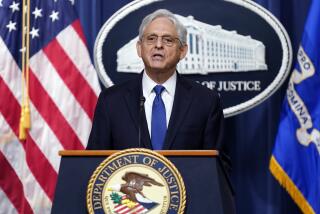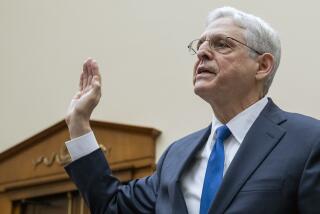U.S. official says he won’t discuss corruption in Iraq
- Share via
WASHINGTON — State Department officials faced new allegations Thursday of attempting to conceal misdeeds by the Iraqi government after refusing to tell congressional investigators whether Prime Minister Nouri Maliki has blocked corruption investigations into his cabinet and family members.
The charges came at an occasionally emotional hearing at which a senior State Department official responsible for Middle East policy said neither he nor other diplomats working in Iraq would discuss corruption by Iraqi officials in public.
Lawrence E. Butler, the deputy assistant secretary of State for Near Eastern Affairs, told the House Oversight and Government Reform Committee that the information was considered classified because it could damage relations between the United States and Iraq, and could only be discussed in private with members of Congress.
“Where revelation of information would damage bilateral relationships, it is intended to be kept confidential,” Butler told the committee. “It goes to the nature of our relationship with the government of Prime Minister Maliki.”
The showdown was the latest in a series of confrontations between the State Department and Rep. Henry A. Waxman (D-Beverly Hills). As the committee chairman, Waxman has repeatedly accused department officials of attempting to cover up misdeeds in Iraq, including alleged abuses by Blackwater USA, the main private security contractor for U.S. diplomats in the country.
Waxman aides said they might seek to question Secretary of State Condoleezza Rice about the decision to restrain diplomats from discussing instances in which Maliki’s government allegedly ordered Iraqi auditors to close cases on family members and political allies.
“I think that Secretary Rice is going to have a confrontation with this committee, because we’re not going to accept the idea that if you say something that could be negative about the Maliki government, it’s classified, but if you say something positive about them, it’s OK,” Waxman said.
Butler’s refusal to answer the questions drew angry accusations from several Democratic congressmen, as well as a gentle rebuke from David M. Walker, the U.S. comptroller general and head of the Government Accountability Office. Walker called State Department officials’ refusal to discuss even general issues of Iraqi corruption “overreaching.”
But Republicans defended the move, saying it was necessary to protect the working relationship between U.S. Embassy officials and their Iraqi associates. They said that identifying corrupt Iraqi officials could risk the safety of American diplomats.
“In my judgment, you’re being asked to say that individuals in Iraq are corrupt, and then we have to work with those individuals,” said Rep. Christopher Shays (R-Conn), while defending the State Department’s position. “I don’t see how that helps our soldiers win in Iraq. I don’t see how it makes us safer in Iraq.”
The charges followed several hours of sometimes dramatic testimony by the Iraqi government’s top anti-corruption judge, Radhi Hamza Radhi, who recently decided to flee Iraq and seek asylum in the U.S. after he and his family received repeated death threats.
Radhi, who is highly regarded within the Bush administration and among independent watchdogs, testified that the prime minister’s office blocked his investigations into cabinet ministers and family members, a move he termed “an illegal order” that violated the Iraqi constitution.
“The prime minister and his government have refused to recognize . . . the judicial independence, under the law, to investigate corruption in a nonsectarian and nonpolitical manner,” Radhi said.
Letters obtained by the committee and made public Thursday showed that Maliki’s office repeatedly ordered Radhi’s agency, the Commission on Public Integrity, to either close cases against his ministers or to obtain Maliki’s approval to move forward.
However, within Congress, the level of partisan rancor about the war has grown so intense that even Radhi’s testimony stirred discord. Republicans tried to paint Radhi as part of a Democratic effort to undermine support for the war and, through their questioning, sought to undercut his credibility.
Rep. Dan Burton (R-Ind.) tried to link Radhi to Saddam Hussein’s regime, repeatedly asking Radhi how he was able become a public prosecutor under former dictator.
Radhi, who was jailed and tortured under Hussein’s regime, said he graduated from Iraqi judicial schools and rose through the ranks, but quit in 1992 as a protest.
“Of course, under Saddam Hussein, I refused to do what he was asking,” Radhi said, speaking through a translator. “And, therefore, they put me in prison.”
--
More to Read
Get the L.A. Times Politics newsletter
Deeply reported insights into legislation, politics and policy from Sacramento, Washington and beyond. In your inbox twice per week.
You may occasionally receive promotional content from the Los Angeles Times.










